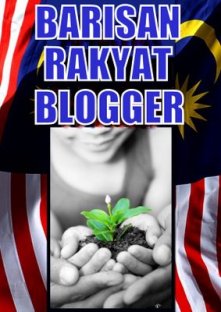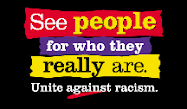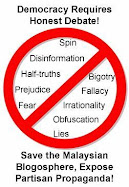
Let's start having the real conversations we need to have. How do we create together our Malaysian Dream that will make us proud of ourselves & our Nation? This is too important a question to let the likes of Deminegara decide for us.
Recently, blogger Ninitalk posted a very thoughtful & inspiring entry entitled "E Pluribus Unum - Out Of Many, One!", which was highlighted at Rocky's Bru. In it Nini notes some parallels between Malaysia and the United States, and draws some lessons in race relations, and creating unity in diversity that we could learn from them. She writes:
"America does this wisely and systematically through a common language, a common education system, a common constitution and law. Lately common national pursuits like the fight against terrorism and the pledge to uphold democracy at home and abroad have united the American people and given them a relevant impetus and a modern identity as a nation."Here are my thoughts, inspired by Nini's post:
While America & Americans have done much to define & promote democracy & freedom, we must never delude ourselves that they fully practice whatever they preach. Obama or no Obama, there is ample evidence throughout their history which shows that America often lacks the leadership, courage, will or integrity to live up to what they profess. Therefore we must never, by default, rely on them as the final arbiter of what is right or wrong; instead we must objectively examine each issue on its merits.
Nini is right in pointing out the similarities between us & America. It has been suggested elsewhere that our Jalur Gemilang was inspired by their Old Glory. Like them, we are of many cultures, religions & ethnicities. Like them, we too have struggled with troubled & sometimes violent ethnic relations. However, our similarities do not extend to all areas; evidence suggests that Americans are among the most proud and patriotic people in the world, while we, on the other hand, lag some way behind. Considering that after 52 years of Merdeka we are still telling each other to "balik" to wherever our ancestors came from, it's not difficult to see why. So, maybe there is something that we can learn from them (in this area) after all.
Is Uniformity & Homogeneity Everything?
Indeed, America does have a common language, education system, constitution and law. So does Thailand, Indonesia, the Philippines and France. Yet, in Thailand, to this very day, Malay minorities in the southern provinces are the victims of what some have called genocide. In Indonesia, Chinese minorities are the victims of racist riots, and violence between Muslims & Christians erupts in Maluku Province. In the Philippines, Chinese-Filipinos face racist riots too (e.g. in 1992 & 1998), and crimes such as kidnap-for-ransom, extortion and other forms of harassment. In France, minorities (especially from Africa & Middle East) are culturally, religiously & economically discriminated against & marginalised, also resulting in riots & violence. In those four countries, everyone spoke the official language, went to the same type of schools, had the same laws etc., but they still ended up hating each other's guts. Something had gone seriously wrong there.
Clearly, having a common language, education system, constitution and law is not sufficient by itself to bring about good race relations. Something else is needed. I believe that what set America apart from the others is how that common language, education system, constitution and law came to be, which in turn reflects each country's values & ethos.
Thailand, Indonesia, the Philippines & France valued assimilation & homogeneity over individual freedoms. They were willing to force minorities to assimilate even if it meant trampling over their rights. Their ethos was that the majority culture was somehow superior or more worthy, and minority cultures somehow subordinate; anyone who wanted to enjoy the rights of a citizen had to adopt the majority culture & language or face sanctions.
In the case of Thailand, Indonesia & the Philippines, this forced assimilation was imposed on the minorities by autocratic governments which did not respect human rights very much anyway: Phibun Songkhram's fascist dictatorships (1938 - 1944 and 1948 - 1957), Suharto's "orde baru" (1965 - 1998) & Marcos' martial law (1972 - 1981) respectively. France was not much better.
How did these policies of forced assimilation manifest themselves? In the form of institutionalised & legalised intolerance, discrimination & suppression of minority language, culture & even religion. A common target was vernacular schools, which were either closed or had their curricula changed to limit the time spent learning minority language & culture. Minority languages were removed from public use. Minorities were obliged or "encouraged" to adopt names that sounded like those of the majority. Vernacular language media & press were closed down or had restrictive conditions placed upon them. Cultural practices, even ethnic clothing were banned outright or ostracised. Religious practices & facilities were restricted. In more extreme cases, even minority economic activity was restricted or curtailed by law. Those who did not comply were coerced, punished, fined, taxed, ostracised or denied opportunities. All this was done in the name of "national unity", "cohesion" & "patriotism".
Even when minorities were not specifically targeted by discriminatory laws, as in the case of France (that might change soon), by officially ignoring & denigrating minority cultural & religious practices (e.g. headscarf bans in schools, etc) and only recognising & promoting the majority language & culture, France too, in effect, forced assimilation on its minority populations.
But for all that, perhaps the policy with the most serious & insidious long term consequences was this: to gain political advantage & support for assimilation as well as to increase pressure on minorities to comply, politicians & governments demonised minorities, their culture, language & religion. Anti-minority sentiments and prejudices were whipped up with populist & nationalist propaganda. Minorities were stereotyped & scapegoated for the country's problems, even portrayed as treasonous fifth columnists. Is it at all surprising that the result, still evident today, is deep rooted discrimination, inter-ethnic & religious distrust & violence?
What About America?
On the other hand, America seems to have had an altogether different set of values & ethos. Some of the first white settlers in America had fled Europe because their rights as minorities were not respected in their home countries. This awareness of the value of human rights & freedom was strengthened by fighting off British oppression in their War of Independence. The starting point of their Declaration of Independence was the recognition that everyone had the right to "life, liberty & the pursuit of happiness", and that governments were set up only to protect those rights & freedoms, never to interfere with them. Over time, this high value accorded to human rights & freedoms became the core of their national ethos, the American Dream.
So, what is this "American Dream"? In essence it enshrines (some would say fetishizes) the rights of all Americans (irrespective of race, religion, gender etc.) to make individual choices to gain an education, secure a livelihood, build friendships and family, and live in peace, free of oppression & undue government interference. In it one's success in life is determined by one's talents and hard work, not by one's family wealth or political connections.
How did this ethos affect how America dealt with minorities? Even when minorities were legally & economically discriminated against, there were no attempts to coerce them into adopting the culture, language & religion of the majority Anglo-Saxon American population. To this day, America does not have an official language. America never had an official religion, and never promoted a national culture based on Anglo-Saxon or Native American culture. There are no "national schools"; the American "common education system" means that parents can freely choose to send their children to public or private schools; they even have the option of homeschooling. Who decides policy in public schools? Ultimately, the citizens themselves; from Wikipedia: "Curriculum decisions in public schools are made largely at the local and state levels; the federal government has limited influence. In most districts, a locally elected school board runs schools. The school board appoints an official called the superintendent of schools to manage the schools in the district."
In short, minority culture, religion & language were never suppressed. Indeed the opposite happened; when some states tried to legitimize intolerance & oppression of non-English languages (prompted by racist sentiments arising from World War 1), the American Supreme Court, in Meyer vs. Nebraska (1923) established a precedent for, and legitimized respect for the language rights of minorities.
So, in spite of all this, how did integration occur, and English become America's common language? As German sociologist & linguist Heinz Kloss, (who studied minorities in America) wrote in his book The American Bilingual Tradition (his own italics):
"As our study shows […] the non-English ethnic groups in the United States were Anglicized not because of nationality laws which were unfavorable toward their languages, but in spite of nationality laws relatively favorable to them. Not by legal provisions and measures of the authorities, not by governmental coercion did the nationalities become assimilated, but rather by the absorbing power of the highly developed American society. The nationalities might be given in numerable possibilities for systematic language maintenance; the manifold opportunities for personal advancement and individual achievements which this society offered were so attractive that the descendants of the "aliens" sooner or later voluntarily integrated themselves into this society."
Naturally & organically, when minorities were confident that their culture, religion and language were not threatened, they learnt & spoke English, and integrated, because they wanted to, not because they were forced to. Today, there are African-Americans, Chinese-Americans, Greek-Americans, Arab-Americans, Indian-Americans etc. Does this make them any less American or any less patriotic? Not in the least.
So, Why Are Americans So Patriotic?
Next question: why are Americans so patriotic? Let's look at the results of the "National Pride in Specific Domains" survey by NORC at the University of Chicago that I quoted earlier. Americans topped the world in national pride in the following three areas: pride in their military, economy and science & technology. This is not surprising at all.
What is revealing is another category in which America tops the world: pride in their Democracy. In this it surpasses the rest of the world by a fair margin; the gap between America & the next country in this category (Australia) is the second highest gap among the 10 categories surveyed. Also interesting is another category in which America was in the top 3 in the world: their pride in fair and equal treatment of all groups in society.
Clearly, our faith & confidence in our democracy & how we treat all Malaysians fairly matters in promoting national pride. Less clear is this: how do we encourage all Malaysians to invest their talents, effort, resources, heart and soul into creating pride-worthy successes in the Malaysian economy, science & technology, arts & literature and sports?
The Americans seem to have found their answer to that question. What motivates them to strive for success in all fields is the American Dream itself. Their human rights & freedoms are protected by their democracy. If they succeed, they get to enjoy the fruits of their success; if they fail, they have only themselves to blame. Americans are patriotic because they have something worthy to believe in & fight for, not because they have been coerced or psycho-ed into patriotism.
Is This Difference Important?
Why is it important for Malaysians to understand this distinction between America on one hand, and Thailand, Indonesia, the Philippines and France on the other? Because it will make all the difference between a Malaysia that is united in diversity & a Malaysia that is rife with racial & religious conflict. As a result of the last general elections, Malaysia is now at a crossroads, from where, for the first time in a long while, we have a choice of taking a path to a future that we want for ourselves & our children. Not everyone is happy that we have this choice, because they would prefer that we return to the days before 8/3/08, and even further back to Mahathirism. Indeed, there are sinister moves afoot in Malaysia that, if we are not vigilant, will take us down the slippery slope to the Thai, Indonesian, Philippine and French model of "national unity".
An example of the kind of people trying to take us down this path is this group of Malaysian bloggers, whose manifesto seems to be:
"...Stop saying we are a multiracial, multicultural, multireligious nation. Stop reminding ourselves to be tolerant of other races, and to live harmoniously in our multiracial society. Stop talking race at every turn. Indeed, ban racial and ethnic classification and identification! We are Bangsa Malaysia, we speak Bahasa Malaysia. But remember, the Arca of this Bangsa Malaysia is the Orang Melayu, the founding fathers of the nation states dotting this Tanah Melayu plus the pribumis of the Borneo states. This unequivocal identity shall be the solid foundation of our nationhood.
Fundamentally, a member of the Bangsa Malaysia should speak the national language of the Federation, Bahasa Malaysia, fluently and as a primary language; be fully versed with adat-adat and tatasusila orang Melayu and other Bumiputras of the Federation; demonstrates respect and deference to Islam as the official religion of the Federation and exhibit traits and mannerisms acceptable to the Malays and other Bumiputras. Non-Malay members of this Bangsa Malaysia may speak in their own dialects in private and may practise their own cultures and religions in the private confines of their community. Also, Budaya Malaysia is based on the budaya of the Malays and other Bumiputras of the Federation – in their various representations.
And the Education System is based on a single, unified Sekolah Kebangsaan system with Bahasa Malaysia as the primary language of instruction
Later, upon satisfactory cohesion and amalgamation of the Malaysian populace into a truly united Bangsa Malaysia, then by law, ALL references to race and ethnicity in our daily activities should be forbidden..."
A few paragraphs later, they say this: "Measures must be conceived and implemented to forge this Bangsa Malaysia society. Perhaps more assertive measures must be implemented." Does all this sound like the Thai model to you? You are right; I have shown here how these folks have actually been inspired by the Thai Ratthaniyom, Phibun Songkhram's policy of forced assimilation of minorities.
Recently, they proposed "Satu Sekolah Untuk Semua" in a memorandum to the Education Minister, in which they accused Malaysian minorities of not being patriotic, and compared vernacular schools to a cancer afflicting Malaysia. They also proposed that the languages & cultures of Malaysian minorities be banished from all national & public roles and be confined to private community matters only. They claim that this "ghettoization" of Malaysian minority culture & languages is required by our Federal Constitution. In the memorandum, they also call for the outright abolition of all vernacular schools in Malaysia.
These people (whom Rocky somehow describes as "pro-unity bloggers" trying to create "a 'true' Bangsa Malaysia") misrepresent their Thai style forced assimilation as integration, and hope that we won't notice the difference. In the blogosphere, they have no qualms about manipulating public opinion using "false flag" tactics. They seem unwilling to discuss & debate their proposal thoroughly, but want it implemented hurriedly. Anyone who doesn't agree with them is deemed as unpatriotic or even racist. Their most recent proposal is to hold a referendum on the abolishing of vernacular schools; in their words, "A simple Yes-No answer". What was their response to the legitimate concerns raised by Malaysians concerning their scheme: "Why should the selfish indulgence of some elements within the 24+7 percent of the populace hold our beloved nation hostage to debilitating social fragmentation in perpetuity?". "Pro-unity bloggers" indeed!
While these people certainly have every right to propose their suggestions (as we have every right to oppose them), it would have been better if they had been honest about their intentions, instead of hiding behind a smokescreen of "patriotism" & "national unity"
In Conclusion
So what can we conclude for ourselves? Firstly, if we want to learn any lessons from America, let's make sure that we learn the right ones. How we achieve a common language, education system, constitution & law is just as, if not more important than merely possessing those attributes. Homogeneity by itself is worthless, and forced assimilation, as shown by the examples above, works against true national unity & cohesion. How we protect the rights & freedoms of all Malaysians, and give them something to work for & believe in, will determine how patriotic & proud we are of Malaysia
Let's not get distracted by the fancy campaigns, flashy branding, catchy slogans & glitzy logos. These are high on form but low on function; we have wasted too much time & resources on these already. Instead, let us focus on the substance, the basics. Let's start by developing our democracy & empowering our citizens. Let's start having the real conversations we need to have. How do we create together our Malaysian Dream that will make us proud of ourselves & our Nation? This is too important a question to let the likes of Deminegara (or his friend Rocky) decide for us.
There is one more, very critical way in which we are a lot like America. Like them, we too often lack the leadership, courage, will & integrity to live up to what we profess. I believe it's no use waiting for our politicians from any party to take us there by the hand. As Nini said, we can’t erase history but we can definitely remove the baggage of hate, vindictiveness and prejudice. Are we Malaysians prepared to step up & lead the way ourselves?
Malaysian Heart
Note: Please do visit all the links I attached to read the posting or article in its entirety. In that way you can judge for yourself if I have quoted them relevantly & in context.





























